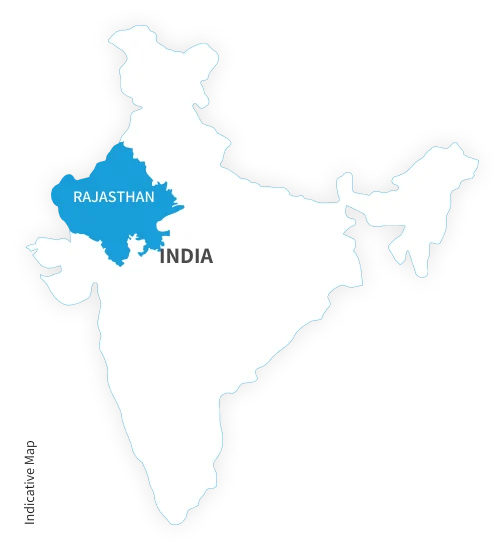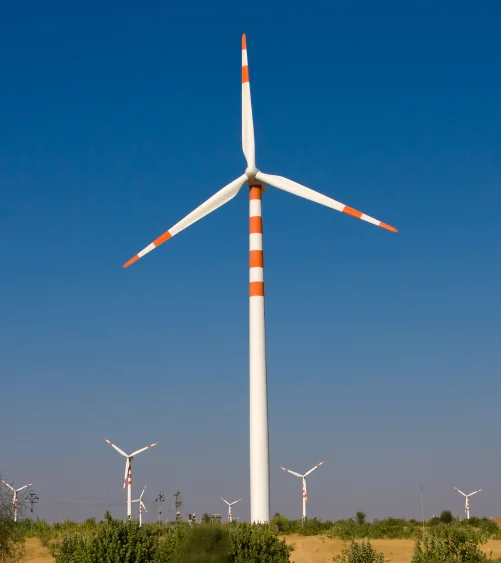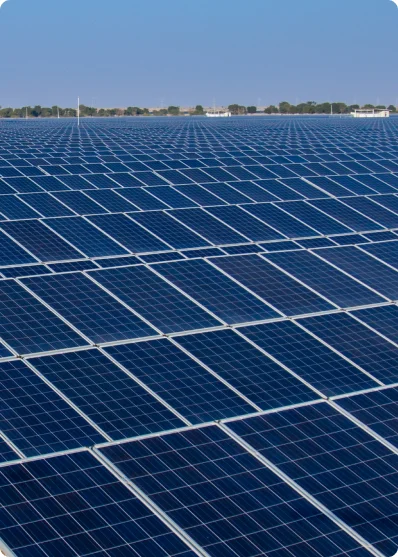Renewable Energy

INDIA LANDSCAPE
National Strategic Priority
- India's target is to achieve 500GW Non-fossil energy capacity by 2030
- Reduction of the carbon intensity of the economy by 45% by 2030, over 2005 levels
- 50% of its energy requirements from renewable energy by 2030. India plans to create an extra 2.5-3 billion tons of carbon sink by 2030
- 50 Solar Parks with an aggregate capacity of 37.49 GW, Wind Energy has an offshore target of 30 GW by 2030, 26.7 GW of Pumped Storage requirement by 2032, 47.2 GW of BESS requirement by 2032
- India aims to achieve its target of 5 MMT of Green Hydrogen production, which will need 125 GW of Renewable Energy, by 2030
- India is on spree to enhance the installation of Renewable Energy to 500 GW by 2030

Sector Performance at the National Level

- India is India is the 3rd largest energy consuming country in the world.
- India is 4th globally for total renewable power capacity additions. As of May 2024, Renewable energy sources, including large hydropower, have a combined installed capacity of 195.01 GW.
- India ranks 4th in Wind Power Capacity and 5th in Solar Power Capacity globally
- India saw the highest year-on-year growth in Renewable Energy additions of 9.83% in 2022. The installed Renewable Energy capacity (including large hydro) has increased by around 128% since 2014.
- India's installed non-fossil fuel capacity has increased 396% in the last 8.5 years and stands at more than 203.19 GW (including large Hydro and Nuclear), about 45.5% of the country's total capacity (as of Jun 2024). India saw the highest year-on-year growth in renewable energy additions of 9.83% in 2022.
- USD 6137.39 mn Renewable Energy FDI equity inflows till September 2023
- Growth 15.4% (CAGR) in installed renewable power generation capacity
Rajasthan Landscape
Sector Performance:
- Rajasthan ranks 2nd among Indian states in terms of installed capacity of renewable energy, with a total of 28617 MW.
- Renewable energy accounts for around 20.3% of the state's total installed power capacity, with the remaining ~78.79% coming from conventional sources.
- Rajasthan ranks 1st in solar with an installed capacity of 22860.73 MW, with over 325 clear sunny days in a year.
- Rajasthan ranks 3rd in wind power with an installed capacity of 5195.82 MW
- Amongst all the major states, Rajasthan has registered the highest annual growth (18.63%) in the installed capacity of renewable energy.
- Rajasthan had the highest installed capacity of grid connected renewable power (22,398 MW) in 2023 followed closely by Gujarat (19,436MW), mainly on account of wind and solar power
- As of early 2024, the state surpassed 18 GW of installed solar capacity, making it the leading state in India in terms of solar power generation.
- By end of 2024, Rajasthan's installed wind power capacity to be reached approximately 4.5 GW.
- In the first 10 months of 2023-24, Rajasthan produced 39,300 million units of green energy, a three-fold increase compared to the same period in 2019-20.
Rajasthan: Value Proposition for Renewable Energy Investors

- Rajasthan's solar generation potential has been assessed at 142 GW
- Rajasthan aims to achieve 90 gigawatts (GW) of renewable energy capacity by the fiscal year 2020-30
- Rajasthan is a leader in the production of silver, which is used in solar cells. The state is also a major producer of minerals like feldspar and ball clay, essential for the glass industry and used in the front cover of solar panels.
- Rajasthan plays a notable role in the manufacturing of fiberglass, resin, and plastic products in India. These materials, comprising 11-16% of the turbine mass, are used in the blades and nacelle of wind turbines.
- The state has large tracts of flat and desert land, ideal for setting up extensive solar and wind farms. Rajasthan receives high levels of solar radiation, averaging 6-7 kWh/m²/day, making it an excellent location for solar energy projects. Regions like Jaisalmer, Barmer, and Jodhpur experience consistent and strong wind currents, essential for wind energy generation, offering ideal locations for wind power projects.
Rajasthan is committed to the development of the Renewable Energy sector through infrastructure support.
- Green Energy Corridor: A green energy corridor is being developed in western Rajasthan to integrate solar and wind power production. This includes a network of grid sub-stations expected to generate 6,311 MW of green energy
- Rajasthan offers vast tracts of government land at competitive rates. The state boasts a fully operational solar park spanning 5,700 hectares, including the 2,245 MW Solar Park in Bhadla.
- The state also has significant hubs and clusters for solar and wind energy.
- Bhadla Solar Park Cluster
- Jaisalmer Wind Energy Cluster
- Barmer Solar & Wind energy Cluster
- Phalodi-Pokhran Solar Cluster
- Pugal and Khuiyala Solar Cluster: Bikaner District
- Rajasthan has 415+ well developed industrial parks spread over 51,500 acres of industrial land available (#4 in India)
- High Solar Radiation: Rajasthan receives some of the highest solar radiation in India, with more than 320+ sunny days a year. This makes it perfect for large-scale solar installations.
- Strong Wind Speeds: Western Rajasthan, especially areas like Jaisalmer, experiences strong wind speeds, making it suitable for wind energy projects.
- Abundant Barren Land: The state has vast tracts of barren land, particularly in the Thar Desert, which is suitable for setting up extensive solar parks.
- Rajasthan provides access to around 40% of India's market in the neighboring states and also serve as an indispensable medium of transport between North-Indian states and the ports on the Western coastline of India
- Rajasthan has 3rd Largest network of national highways with 20 major National Highways, 5th largest rail network in India, providing easy access to major ports such as Mundra Port and JNPT, nine Inland Container Depots, one Air Cargo Complex as well as seven airports with direct international and national connectivity.
- Further, over 58% of State's area within Delhi Mumbai Industrial Corridor (DMIC).
- Universities: Rajasthan has a total of 88 universities out of which 53 private universities, 28 state funded universities and 7 other universities.
- Central Government Institutes: institutions such as Regional Research Institute (H) Jaipur, etc.
- Technical Institutes: The state is home to numerous technical institutes, including prestigious ones like the Indian Institute of Technology (IIT) Jodhpur and Indian Institute of Management, Udaipur, Indian Institute of Information Technology (IIIT) - Kota, National Institute of Logistics & Material Management, Udaipur, National Law University, Jodhpur, All India Institute of Medical Sciences, Jodhpur, FDDI - Jodhpur. The Birla Institute of Technology & Science, Pilani, etc. Centre of Excellence in Renewable Energy Education and Research (CoE-RER) at MNIT Jaipur focus on cutting-edge research in renewable energy
- Rajasthan is actively developing its skilled workforce in the Renewables sector, with a sharp focus on comprehensive skill development initiatives.
- Support offered under schemes available for skilling, and infrastructure and technological development.
Policies & Incentives
Rajasthan Investment Promotion Scheme (RIPS) 2024
For Solar PV Module and Cell Manufacturing
Asset Creation Incentives (ACI)
- Capital subsidy up to 13-28% of EFSI to be disbursed in annual installments over 10 years, OR
- Turnover Linked Incentives (TLI) 1.20%-2.0% of Net Sales Turnover to be disbursed annually for 10 years, OR
- Investment subsidy (net SGST reimbursement) up to 75% of the State tax due & deposited for a period of 7 years
Exemptions
- 100% exemption on electricity duty for 7 years
- 100% stamp duty and conversion charge exemption
Special incentives
- Employment Booster - 10% - 15% booster on chosen ACI
- Training & Skilling Incentive: Skilling support in form of a Training Subsidy of Rs. 4000 per worker per month for 6 months for training delivered in Rajasthan
Additional incentives
(For manufacturing thrust sectors)
- Sunrise Booster - 25% Sunrise booster on top of the ACI chosen OR
- 10% thrust booster on top of ACI chosen, OR
- 5% interest subsidy for 5 years, OR
- 20% anchor booster on top of ACI chosen to first 3 units in a region / sector
- Policy allows phasing of investment without loss in benefits
- Additional flexibility for investors to design own ACI mix through customized packages (Min INR 500 crore).
Incentives for Renewable Energy Plants:
Asset Creation Incentives (ACI)
- Investment Subsidy of 75% of State tax due and deposited for a period of 7 years.
Exemptions
- Exemption from 100% of electricity duty for 7 years.
- 100% conversion charges benefits given in stages as notified by the State.
Other incentives
- The State will promote development of Solar Plants in Joint Venture with private developers by investing up to 50% equity or any other percentage of equity participation as decided by the State Government.
Customized Packages
- Additional flexibility for investors to design own ACI mix through customized packages for investment over INR 500 crore. In case of investments greater than INR 1000 Cr. and greater than 800 employment generation, the State reserves the right to grant customization on a higher NPV of the Asset Creation Incentive up to up to 20% of the NPV of the chosen Asset Creation Incentive as part of the manufacturing/ services standard package on a case-to-case basis.
Rajasthan Micro, Small and Medium Enterprises Policy, 2024
- Exemption from Approvals: MSMEs are exempt from obtaining certain approvals and inspections required under various state laws for a specified period.
- Simplified Procedures: The Act simplifies the process for setting up and operating MSMEs by reducing bureaucratic hurdles.
- Single Window Clearance: A single window clearance system is in place to facilitate quick and efficient processing of applications and approvals.
- Support for Inclusive Growth: The Act aims to promote inclusive economic growth and employment generation by supporting MSMEs.
Rajasthan Green Hydrogen Policy, 2023
The Rajasthan Green Hydrogen Policy, 2023, offers several incentives to encourage the development of green hydrogen in the state. Key incentives include:
- Transmission and Distribution Charges: A 50% exemption on transmission and distribution charges for 10 years for facilities producing 500 kilotons per annum (KTPA) of renewable energy.
- Cross-Subsidy Surcharge: A 10-year exemption from cross-subsidy surcharges for green hydrogen procured from third parties.
- Land Allotment: Competitive rates for land allotment to set up green hydrogen production facilities.
- Banking Charges: Waiver of banking charges for electricity generated from renewable sources.
Rajasthan Renewable Energy Policy, 2023
The Rajasthan Renewable Energy Policy, 2023, offers several incentives to promote the development and integration of renewable energy in the state. Key incentives include:
- Transmission and Distribution Charges: Exemption from transmission and distribution charges for renewable energy projects.
- Cross-Subsidy Surcharge: Waiver of cross-subsidy surcharges for renewable energy.
- Electricity Duty: Reduction in electricity duty on solar energy from 60 paisa per unit to 40 paisa per unit.
- Land Tax: 100% exemption on land tax for renewable energy projects for seven years.
- Banking Charges: Waiver of banking charges for electricity generated from renewable sources.
Rajasthan Biomass and Waste to Energy Policy, 2023
The Rajasthan Biomass and Waste to Energy Policy, 2023, offers several incentives to promote the use of biomass and waste for energy production. Key incentives include:
- Subsidies and Grants: Financial support in the form of subsidies and grants for setting up biomass and waste-to-energy plants.
- Land Allotment: Provision of land at concessional rates for establishing these plants.
- Tax Exemptions: Exemptions on various state taxes and duties for a specified period to reduce the initial financial burden on developers.
- Priority in Grid Connectivity: Priority access to grid connectivity for the power generated from biomass and waste-to-energy plants.
- Financial Assistance for R&D: Support for research and development activities in the field of biomass and waste-to-energy technologies.
Ease of Doing Business

- RajNivesh portal provides a single point, online interface and a time-bound clearance system by acting as a single platform for approval / tracking center for clearances & approvals
- The platform integrates over 120+ services across 14 departments, emphasizing the state's commitment to the implementation of investor-friendly policies that enhance ease of doing business and promote sustainable development policies that enhance ease of doing business and promote sustainable development.
- Automated Processes: Automated systems for services like registration, licensing, and bill payments.
- Reduced Compliance Burden: Simplified labor laws, environmental clearances, and other regulatory procedures.
- Time-Bound Services: Guaranteed timelines for services, ensuring prompt delivery.
- Dedicated Teams: Specialised teams for investor support, handholding, and facilitation.
Opportunities
Green Hydrogen Production
Pumped Hydro Storage
Offshore Wind energy
- Floating Wind Turbines
- Grid Integration
Solar-Wind Hybrid Projects
- Hybrid microgrids
Major Players in Rajasthan







